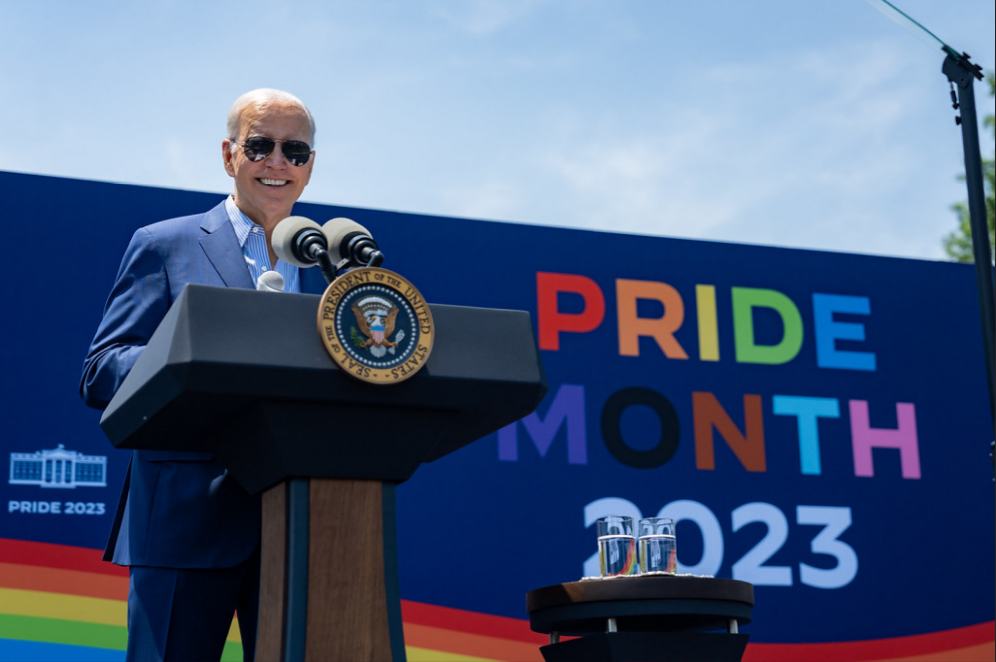Politics
N.H. voters elect country’s first out transgender statewide candidate
Stacie Laughton will represent Nashua in the state House of Representatives; gay men also elected to state Senate and Executive Council.

A New Hampshire Democrat on Tuesday became the first openly transgender person elected to state office in the country.
Stacie Laughton, a Nashua selectman, will represent portions of the state’s second largest city located on the Massachusetts border in the New Hampshire House of Representatives. She and two other Democrats defeated two Republicans who had also ran.
The N.H. House has 400 members from 103 districts. Each lawmaker has an average of 3,300 constituents, but the most populated districts can have up to 13 representatives.
Laughton did not immediately respond to the Washington Blade’s request for comment, but she said in a campaign video she would “always fight for the rights of the LGBT community.” New Hampshire lawmakers in 2009 rejected a bill that would have added gender identity and expression to the state’s non-discrimination law.
Laughton told the [Nashua] Telegraph newspaper she hopes her election will inspire other LGBT people to seek political office.
“I believe that at this point, the LGBT community will hopefully be inspired,” Laughton told the newspaper on Nov. 8. “My hope is that now maybe we’ll see more people in the community running, maybe for alderman. Maybe in the next election, we’ll have a senator.”
Gay former state Rep. Ray Buckley, who chairs the New Hampshire Democratic Party, welcomed Laughton’s election.
“Serving in the N.H. House is an extraordinary experience because it brings together 400 citizens from all walks of life to work together,” he told the Blade. “Having a transgendered person as a member of the House will bring a unique experience and perspective to the challenges facing the state.”
Joelle Ruby Ryan, a transgender activist who is also a professor at the University of New Hampshire, agreed.
“Words cannot express how excited I am about the election of Ms. Stacie Laughton to the N.H. House of Representative,” she told the Blade. “As a transgender activist in N.H. for 20 years now, I can honestly state that this is a pivotal milestone in our long struggle for full equality and civil rights.”
Mara Keisling, executive director of the National Center for Transgender Equality, also described Laughton’s election as “historic.”
“We’re thrilled she was elected,” said Keisling. “She did it the grassroots way you have to do it in New Hampshire. She’s part of the community and clearly did it right, so it’s pretty impressive she got elected.”
Nashua voters elected Laughton on the same night former state Sen. Maggie Hassan defeated Republican Ovide Lamontagne to become New Hampshire’s next governor. The state’s next congressional delegation will be all women after former Congresswoman Carol Shea-Porter and Ann McLane Kuster defeated incumbent U.S. Reps. Frank Guinta and Charlie Bass respectively.
House Minority Leader Terie Norelli (D-Portsmouth) could also potentially become the next speaker of the N.H. House after Democrats regained control of the chamber.
Gay candidates elected to state Senate, Executive Council
State Rep. David Pierce (D-Etna) on Tuesday became the first openly gay state Senate candidate elected to the chamber. He defeated state Rep. Joe Osgood (R-Claremont) by a 17,719-9,940 vote margin to represent the 5th Senate District that includes the town of Hanover in which Dartmouth College is located.
Pierce, who testified in support of New Hampshire’s marriage equality bill in 2009 and against a measure earlier this year that would have repealed it, told the Blade during an interview last month Osgood pointed out to his supporters and local reporters the Gay and Lesbian Victory Fund endorsed his campaign.
He said after his election that his sexual orientation never became an issue for voters.
“Thankfully, my Tea Party opponent was cowed into not raising the gay issue in this campaign,” said Pierce. “That’s because [New Hampshire] has led the nation in the marriage equality fight; we’re the ‘Life Free or Die’ state. The issues that matter most to the voters — jobs, economy, equality, health care, education, environment — are why they cast their ballots for me by a 28-point margin. I’m proud to be the first out candidate elected to the N.H. Senate, and will never forget my roots. My husband [and] our two daughters deserve nothing less.”
Gay former state Rep. Chris Pappas will represent Manchester, New Hampshire’s largest city, and surrounding towns in the Merrimack Valley on the Executive Council after defeating Hillsborough County Treasurer Robert Burns by 63,641-50,907 vote margin. Pappas will succeed former Manchester Mayor Ray Wieczorek who did not seek another term on the five-member gubernatorial advisory and oversight body.
“Most Americans realize that your ability to do a job is not determined by your gender identity or sexual orientation,” said Jerame Davis, executive director of National Stonewall Democrats. “And that reality is starting to show up at the ballot box.”
Ryan agreed.
“I am excited about the coming years and the possibilities for genuine progress in our slate of agenda items for transgender rights,” she said, referring to Laughton’s election. “In particular, I hope to see N.H. pass a bill banning discrimination on the basis of gender identity/expression, which currently exists in the rest of New England, as well as work on other policy issues. The elections were inspiring for progressives and minority groups in general. Stacie Laughton’s election is amazing evidence that times really are a-changing, and our hard work for justice and liberation for all gender-variant people is finally bearing fruit.”
Congress
Lawmakers champion drug policy reforms at National Cannabis Policy Summit
Congressional leaders pledged their support for decriminalization

Speaking at the 2024 National Cannabis Policy Summit on Wednesday, congressional leaders pledged their support for proposals to remedy the harms of America’s War on Drugs while protecting cannabis users and cannabis businesses that are operating under a fast-evolving patchwork of local, state, and federal laws.
Overwhelmingly, the lawmakers who attended the conference at the Martin Luther King Jr. Memorial Library in D.C. or delivered their remarks virtually were optimistic about the chances of passing legislative solutions in the near-term, perhaps even in this Congress.
Participants included U.S. Sens. Raphael Warnock (D-Ga.), Jeff Merkley (D-Ore.), Elizabeth Warren (D-Mass.), and Senate Majority Leader Chuck Schumer (D-N.Y.), along with U.S. Reps. Eleanor Holmes Norton (D-D.C.), Earl Blumenauer (D-Ore.), and Barbara Lee (D-Calif.), who co-chairs the Congressional Cannabis Caucus and was honored at the event with the Supernova Women Cannabis Champion Lifetime Achievement Award. Republicans included an aide for U.S. Rep. David Joyce (R-Ohio) who was featured in an afternoon panel discussion about the cannabis policy landscape on Capitol Hill.
Each of the members have long championed cannabis-related policy reforms, from Merkley’s SAFER Banking Act that would allow cannabis businesses to access financial services (thereby affording them the critically important protections provided by banks) to Lee’s work throughout her career to ameliorate the harms suffered by, particularly, Black and Brown communities that have been disproportionately impacted by the criminalization of marijuana and the consequences of systemic racism in law enforcement and the criminal justice system.
The lawmakers agreed America is now at an inflection point. Democratic and Republican leaders are coming together to support major drug policy reforms around cannabis, they said. And now that 40 states and D.C. have legalized the drug for recreational or medical use, or both, the congress members stressed that the time is now for action at the federal level.
Last summer, the U.S. Department of Health and Human Services issued a formal request to re-categorize marijuana as a Schedule III substance under the rules and regulations of the Controlled Substances Act, which kicked off an ongoing review by the Biden-Harris administration. Since the law’s enactment in 1971, cannabis has been listed as a Schedule I substance and, therefore, has been subject to the most stringent restrictions on and criminal penalties for its cultivation, possession, sale, and distribution.
Merkley acknowledged that re-scheduling would remedy the Nixon administration’s “bizarre” decision to house marijuana under the same scheduling designation as far more harmful and addictive drugs like heroin — and noted that the move would also effectively legalize biomedical research involving cannabis. However, the senator said, while re-scheduling “may be a step in the right direction, it’s not de-scheduling” and therefore would not make real inroads toward redressing the harms wrought by decades of criminalization.
Likewise, as she accepted her award, Lee specified that she and her colleagues are “working night and day on the legalization, not re-scheduling.” And her comments were echoed by Warren, who proclaimed in a prerecorded video address that “de-scheduling and legalizing cannabis is an issue of justice.”
Congressional Republicans have blocked legislation to legalize marijuana, the Massachusetts senator said, “and that is why the scheduling is so important,” as it might constitute a “tool that we can use to get this done without Republican obstruction.”
Warren, Merkley, and Schumer were among the 12 Senate Democrats who issued a letter in January to the U.S. Drug Enforcement Administration requesting transparency into its re-scheduling process while also, more importantly, demanding that the agency fully de-schedule cannabis, which would mean the drug is no longer covered by the Controlled Substances Act.
However, in a possible signal of political headwinds against these efforts, their Republican colleagues led by U.S. Sen. Mitt Romney (R-Utah) responded with a letter to DEA Administrator Anne Milgram “highlighting concerns over HHS’s recommendation to reschedule marijuana from a Schedule I to Schedule III-controlled substance.” The GOP signatories, all of whom serve on the Senate Foreign Relations Committee, also sought to “underscore the Drug Enforcement Administration’s (DEA) duty under the Controlled Substances Act (CSA) to ensure compliance with the United States’ treaty obligations under the Single Convention on Narcotic Drugs.”
As Norton noted during her prepared remarks, elected Democrats are not necessarily always on the same page with respect to expanding access to economic opportunity facilitated by cannabis. For instance, though President Joe Biden had promised, during his State of the Union address this year, to direct his “Cabinet to review the federal classification of marijuana, and [expunge] thousands of convictions for mere possession,” Norton blamed Biden along with House Republicans for provisions in the federal budget this year that prohibit D.C. from using local tax dollars to legalize cannabis sales.
A non-voting delegate who represents the city’s 690,000 residents in the House, Norton called the president’s position “deeply disappointing,” particularly considering his record of supporting “D.C. statehood, which would allow D.C. to enact its own policies without congressional interference” and grant its residents voting representation in both chambers of Congress. She added that the majority of Washingtonians are Black and Brown while all are held responsible for “the obligations of citizenship including paying federal taxes.”
Norton said the city should also have the power to grant clemency for crimes committed in the District, including cannabis-related crimes — power that, currently, can only be exercised by the president.
Some Republican lawmakers have been at the forefront of efforts to reform harmful cannabis regulations. For instance, a participant in a mid-afternoon panel pointed to the CURE Act, a bill introduced by U.S. Reps. Nancy Mace (R-S.C.) and Jamie Raskin (D-Md.) that would prohibit the federal government from denying security clearances based on applicants’ past or current use of cannabis.
While securing statehood for D.C. and de-scheduling cannabis via legislation or administrative action are perhaps, at least for now, a heavy lift, Merkley pointed to promising new developments concerning his SAFER Banking Act.
The Oregon senator first introduced the measure, then titled the SAFE Banking Act, in 2019, and he said the legislation’s evolution into its current iteration was difficult. “Regulators don’t want to be told what to do,” Merkley said, and negotiations with these officials involved “nitty-gritty arguments over every word.”
Pushback also came from one of Merkley’s Democratic colleagues. In September, Warnock, who is Georgia’s first Black U.S. senator, voted “no” on the 2023 version of the SAFER Banking Act, writing: “My fear is that if we pass this legislation, if we greenlight this new industry and the fees and the profits to be made off of it without helping those communities” most harmed by the War on Drugs “we will just make the comfortable more comfortable.”
Warnock’s statement followed his pointed remarks expressing concerns with the legislation during a Senate Banking Committee hearing.
“Let me be very clear,” he said, “I am not opposed to easing or undoing federal restrictions around cannabis. And I would support all of the provisions and reforms in this legislation if paired with broader cannabis reforms that substantively address the issue of restorative justice. This bill does not do that.”
At this point, however, the latest version of the SAFER Banking Act has advanced out of committee and earned the support of Senate leaders including Schumer and much of the Republican conference.
“This is the moment,” he said. “Let’s not let this year pass without getting this bill — the safer banking bill — through the House, through the Senate, and on the president’s desk.”
In her remarks, Lee also discussed the importance of business and industry-wide reforms like those in Merkley’s bill.
“We have to make sure that the cannabis industry is viewed by everyone, especially our federal government, as a legitimate business,” Lee said. “Legitimate, which deserves every single aspect of financial services that any legitimate business deserves and has access to.”
Like Warnock, the congresswoman also highlighted how these financial and business considerations intersect with “equity issues,” as “those who have been most impacted by this horrible War on Drugs” must “become first in line for the businesses and for the jobs and for the economic opportunity the cannabis industry provides.”
Reflecting on her experience introducing the Marijuana Justice Act in 2019, which was Congress’s first racial justice cannabis reform bill, Lee remembered how “everyone was like, ‘why are you doing this? It’s politically not cool.’” Her legislation sought to end the federal criminalization of marijuana, expunge the criminal records of those convicted of cannabis-related crimes, and reinvest in communities that have suffered disproportionately from the War on Drugs.
The congresswoman said she explained to colleagues how the bill addressed “many, many layers” of often-intersecting problems linked to federal cannabis policy, telling them: “This is a criminal justice issue, a racial justice issue, an issue of equity, a medical issue, a veterans’ issue, and an issue of economic security.”
Two years later, with a 220-204 vote, the House successfully passed the Marijuana Opportunity Reinvestment and Expungement Act, a comprehensive bill introduced by U.S. Rep. Jerry Nadler (D-N.Y.) and to the Senate by then-U.S. Sen. Kamala Harris (D-Calif.). The measure included Lee’s Marijuana Justice Act.
“This bill is the product of many, many years of advocacy for federal cannabis reform and equity,” she said in a statement celebrating the bill’s passage. “Make no mistake: This is a racial justice bill. It’s about the thousands of people of color who sit in jail for marijuana offenses while others profit. It’s about finally repairing the harms of the War on Drugs on communities and families across the country.”
“We’ve come a long way,” she told the audience on Wednesday. “And now we have a long way to go.”
Politics
First lady warns Trump is ‘dangerous to the LGBTQ community’ at HRC event
Jill Biden spoke in Arlington, Va., on Friday

Delivering a keynote address at the Human Rights Campaign’s Equality in Action event Friday, First lady Jill Biden warned former President Donald Trump is “a bully” who is “dangerous to the LGBTQ community.”
Her appearance at the three-day volunteer and board gathering at the Sheraton Pentagon City in Arlington, Va., comes as part of the Biden-Harris reelection campaign’s “Out for Biden” program, which aims to “mobilize LGBTQ+ voters, communities, and leaders across the country.”
“Today, this community is under attack,” Biden said. “Rights are being stripped away. freedoms are eroding. More and more state laws are being passed targeting this community. Just last month, we had to fend off more than 50 anti-gay amendments that Republicans tried to force into the government funding bill.”
“These were extreme measures aimed directly at this community — measures that would have limited health care and weakened protections for same sex couples,” she said. “And they served only one purpose to spread hate and fear.”
In a nod to her long career as an educator, Biden said, “History teaches us that our rights and freedoms don’t disappear overnight. They disappear slowly. Subtly. Silently.”
She continued, “A book ban. A court decision. A ‘Don’t Say Gay’ law. One group of people loses their rights and then another. And another. Until one day you wake up and no longer live in a democracy … This is our chapter of history and it’s up to us how it ends.”
Biden then highlighted some of the advancements for LGBTQ rights secured under the Biden-Harris administration.
“Thanks to President Biden, marriage equality is now the law of the land,” she said. “He ended the ban on gay and bisexual men donating blood. He’s made it possible for trans Americans to serve openly and honorably in our military. And he’s standing firmly against conversion therapy.”
“Yes, there are forces outside these walls that are trying to erase these hard fought gains, trying to unwind all the progress that we’ve made,” Biden said. “They want to take our victories away, but we won’t let them. Your president will not let them — I will not let them.”
Politics
‘Out for Biden-Harris’ LGBTQ-targeted campaign is launched
Several events planned in coming weeks

The Biden-Harris campaign on Wednesday debuted “Out for Biden-Harris,” which is a “national organizing and engagement program to mobilize LGBTQ+ voters, communities, and leaders across the country.”
Out for Biden-Harris “will train supporters to organize within their own networks and leverage messengers from the community to ensure we are meeting LGBTQ+ voters where they are,” the campaign wrote in a press release announcement.
“From drag queens to elected leaders to LGBTQ+ faith leaders, Team Biden-Harris will use a wide range of validators to communicate what’s at stake for the LGBTQ+ community in this election and why it’s critical that we vote for Joe Biden and Kamala Harris.”
The campaign also previewed some of the events and initiatives in coming weeks, which will include:
- A virtual organizing call featuring actor Wilson Cruz, Congressman Robert Garcia, HRC President Kelley Robinson, to mobilize LGBTQ+ supporters;
- A series of virtual relational organizing trainings focused on activating and reaching new volunteers targeting battleground voters. The campaign will be engaging trusted messengers, including high-profile and trusted messengers in the LGBTQ+ community, like Brita Filter, Danica Roem, Gina Ortiz Jones, and Rev.
- Hosting a series of Out For Biden-Harris house parties and community events including events in Phoenix, Arizona, Ferndale, Michigan, Milwaukee, Wisconsin, Philadelphia, Pittsburgh, and Harrisburg, Pennsylvania, and Las Vegas, Nevada to mobilize supporters.
- First Lady Jill Biden will be a featured speaker at the Human Rights Campaign Equality In Action Conference bringing together a network of 400 organizers and activists in Arlington, VA.
The campaign noted that LGBTQ voters will be “a key part” of its coalition, while 39 percent of voters consider LGBTQ equality a “make-or-break issue.”
“In 2020, nearly 11,000 LGBTQ+ volunteers mobilized to help elect President Biden and Vice President Harris,” the campaign wrote. “This year, Out for Biden-Harris will re-engage these supporters and build on their work. The program is designed around the idea that there is no better messenger to mobilize LGBTQ+ voters than their friends and neighbors to bring new supporters into our campaign.”
The Biden-Harris administration is the most pro-LGBTQ in history, and LGBTQ groups with a combined 3.8 million members have endorsed President Joe Biden’s reelection campaign.
However, “the fight for equality for all Americans is at stake this November as Trump and his allies plan to roll back the rights and freedoms of LGBTQ+ Americans,” the Biden campaign wrote. “Trump and his MAGA allies are running on an extreme, anti-LGBTQ+ agenda which would push to discriminate against the LGBTQ+ community, even going after the right to marry who you love.”
“LGBTQ+ voters are a force to be reckoned with. They were critical to our victory in 2020, and they will be critical to winning again this November,” said Biden-Harris 2024 Campaign Manager Julie Chavez Rodriguez. “That’s why we’re thrilled to launch Out for Biden-Harris, which will harness the LGBTQ+ community’s organizing prowess to reelect President Biden and Vice President Harris this November.”
Chavez Rodriguez continued, “LGBTQ+ Americans couldn’t have more at stake this election: Donald Trump and his extremist allies are running to gut LGBTQ+ rights and erase history as their top priorities. LGBTQ+ Americans deserve leaders who will fight for every American’s freedom and dignity. That’s what President Biden and Vice President Harris have done throughout their time in office, and what they will do if reelected, including pressing Congress to pass the Equality Act.”
“There has never been a more critical time to protect the rights of all Americans, no matter who you love or how you identify, and Out for Biden-Harris will be critical to not just safeguarding, but strengthening the rights and voice of every single American,” she said.
-

 Africa3 days ago
Africa3 days agoCongolese lawmaker introduces anti-homosexuality bill
-

 Colorado5 days ago
Colorado5 days agoFive transgender, nonbinary ICE detainees allege mistreatment at Colo. detention center
-

 World3 days ago
World3 days agoOut in the World: LGBTQ news from Europe and Asia
-

 Real Estate4 days ago
Real Estate4 days agoBoosting your rental property’s curb appeal













